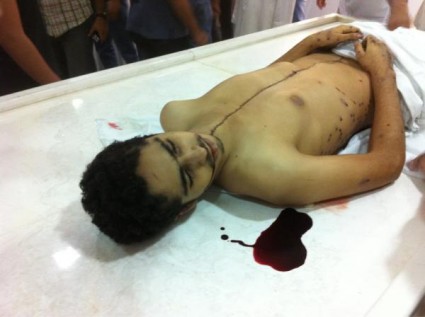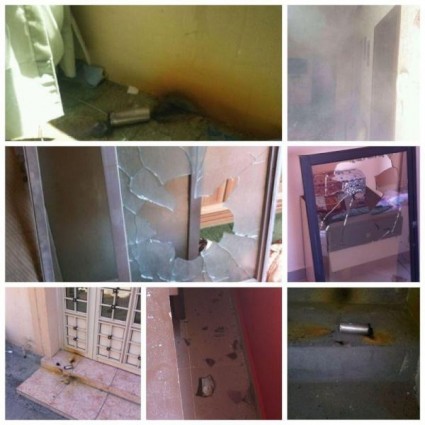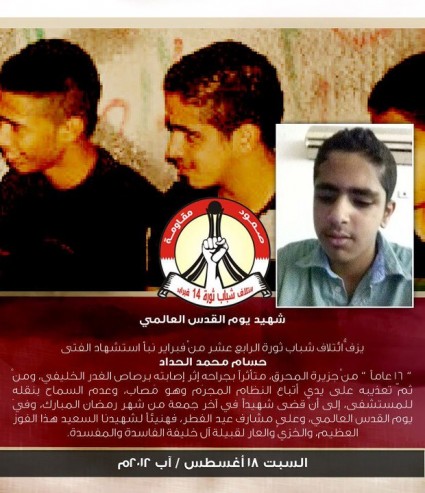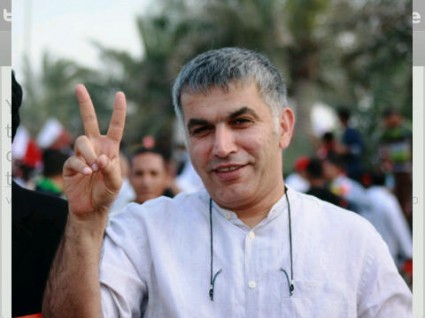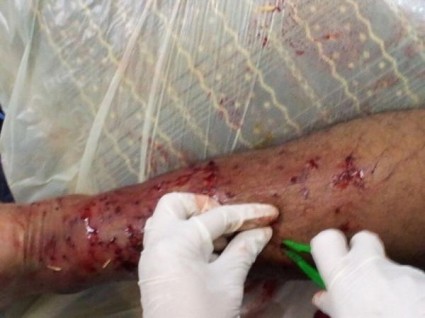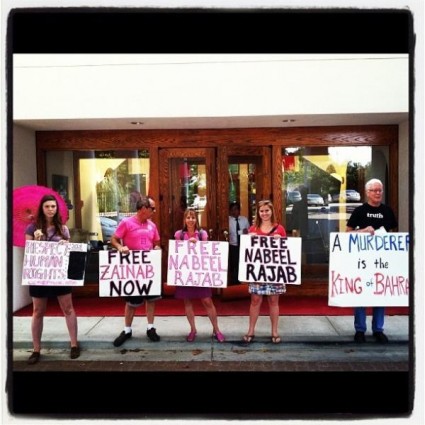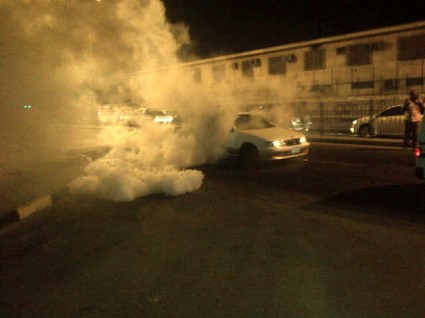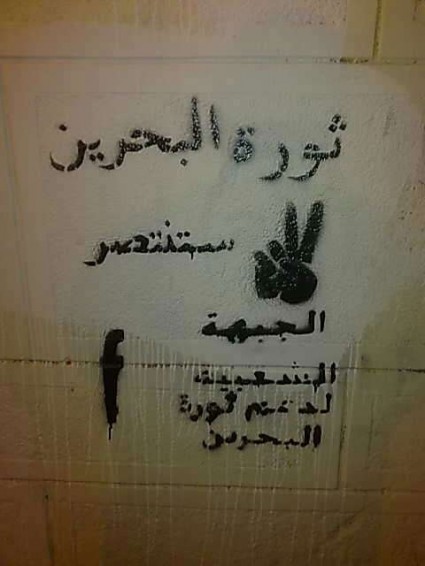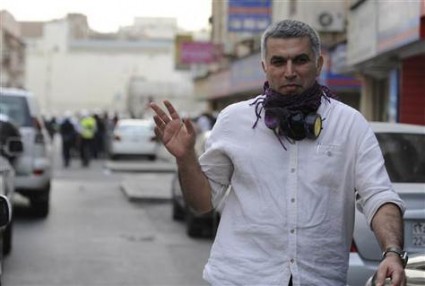Posts from — August 2012
US State Department, GET A GRIP – US consultants are paid to adivse how to kill 16 year boys with shotguns?
August 20, 2012 No Comments
US State Department – Get A Grip On Reality – It Is Not A CS Gas LESS-THAN-LETHAL Training Video
THIS USE OF CS GAS IN TRAINING
IS NOT THIS
August 20, 2012 No Comments
US State Department Stop Watching Riot Control Training Videos And Get A Grip on Reality
THIS USED FOR RIOT CONTROL AND ‘PERSONAL SAFETY’
DOES NOT DO THIS
RUBBER PELLETS DO NOT DO THIS
August 20, 2012 No Comments
Indiscriminate Reign of Terror by Chemical Gas in Shia Villages
August 20, 2012 No Comments
MOI Chemical Gas Attacks on Homes transform them into lethal Gas Chambers
August 20, 2012 No Comments
MOI Murders 16 Year Old, Hussam Mohammed AlHaddad
Bahrain: Child died after being shot by security forces
August 18th, 2012 – Bahrain Youth Society for Human Rights
Hussam Mohammed AlHaddad-16 years old- died after being shot by security forces in Muharraq.
Two witnesses confirmed to the Bahrain Youth Society for Human Rights (BYSHR) that Hussam was shot using bird shotgun by security forces at 9:30pm ( August 17) and then subjected to severe beatings by 15 (approximately) unknown individuals.
…more
August 17, 2012 No Comments
The Silence Heard Around The World and The Pacification of Bahrain
On 14 August, Nabeel Rajab, one of the outspoken leaders and advocates of non-violent regime-change in Bahrain, as sentenced to three years in prison for organizing and participation in illegal gatherings in Bahrain; i.e, nonviolent protest marches against the bloody regime President Obama and the US State Department continue to refer to as ‘friends’. Rajab is one of a few leaders who have managed to remain free in Bahrain during the last one and half years of the regimes brutal government crackdown on those who have called for regime-change. King Hamad, the ruling Monarch in Bahrain, has banned by decree public gathering without permits, which have been categorically denied to advocates of regime-change since the regime’s bloody crackdown began.
Nabeel Rajab now joins the ranks of dozens of other regime-change leaders, that have been systematically brutalized and arrested on falsified and trumped up charges. Among those similarly arrested and detained, are Sheik AlMahfood(5 year sentence) of the recently banned Amal Society and Human Rights Defender Abdulhadi AlKhawaja(life sentence). AlKhawaja is also colleague of Nabeel Rajab and one of many who Rajab has been working to gain their freedom. Another colleague of Nabeel Rajab’s, Said Yousif Almuhafda, was detained yesterday, 15 August, beaten in front of his two young daughters and later released, in a government act of intimidation and in conjunction with the three-year sentence to prison Nabeel Rajab received.
State Department spokesperson Victoria Nuland said that the US embassy contacted Bahraini authorities to voice concern over the jail term given to Nabeel Rajab for “unauthorized” protests against the Sunni monarchy. “We are deeply troubled by the sentencing,” Nuland told reporters. “We believe that all people have a fundamental freedom to participate in civil acts of peaceful disobedience,” she said [from AFP]. Ms. Nuland subtlety echoes the profoundly incorrect perception of sectarianism in the Bahrain uprising. While sectarian conflict exists, the calls for regime-change come from Sunni and Shiite united in their opposition to the ruling regime. Ms. Nuland’s ignorance and insensitively has been noted along with other State Department belligerence and ignorance, leading to disgraceful diplomacy and conduct from State Department politicals that should know better.
“Sternly worded statements” no matter how lofty, be-it from the United States, the UN or others have become meaningless and fall on the belligerent deaf and disrespectful ears of the Bahrain’s ruling regime. When words critical of the regime are sounded, the regime response is to heap even greater violence and repression on the heads of the anti-regime movement. All the while, the regime claims progress on Human Rights to appease its Western critics. The United States in turn affirms the belligerent conduct of its ‘friends’ with a silence that is heard around the world..
My government (US) needs to move beyond the ‘make nice’ rhetoric coming from what seems to be a broken and inept State Department. The State Department seems deceived by or even worse, complicit in, the flagrant violations of Human Rights that continue with impunity by the ruling regime led by King Hamad. The “middle-road to reform” mind-set that is a hallmark of President Obama’s administration, makes reform in Bahrain “more impossible” with each arrest, prison sentence and drop of blood, the regime sheds. The present course can only end in a bloody wound between the people of Bahrain and the United States that can never be healed. My governments polices are crushing people and fueling anti-US hatred with its support for the al Khalifa Regime. It is disheartening that my government continues to refer to this regime as ‘friends’ and foolishly squanders opportunities to build bridges across the anti-regime divide that Secretary Clinton seems to work so tirelessly to preserve.
One only need look as far as the appointment of Ambassador Krajeski to be skeptical of the State Department role in Bahrain. A pattern reminiscence of CIA Pacification Programs that crush dissent seem to shadow Krajeski – from Indonesia, to Egypt, Iraq, Yemen and now Bahrain. It seems the US has controlled and manipulated its “democracy wars” in MENA to build “US branded democracies” and preserve those regimes that serve its hegemonic interests.
The Bahrain anti-regime movement has become the fly in the ointment, with its clear demand for a pluralist democracy with separation of powers. They are sophisticated, well organized and highly educated and for the time being, they have managed to “pin down” opposition reformist who would preserve the regime. This should be a profound message to the Obama administration but this too seems fall on deaf ears.
The reformists continue to maneuver and flirt with the regime whose pacification program has systematically detained the anti-regime leadership through judicial charades and brought a brutal scourge of rape, murder and torture upon the opposition. All of this under the watchful eye of Krajeski and a team of high dollar US security and public relations firms hired out to the regime to legitimize its tyranny. The question is not whether a revolution is coming to Bahrain but it is a question of when. Moreover, one wonders if the US will find its moral footing in the process. To this end, I labor. Sadly, I doubt the US will find its moral footing and this too will be its undoing in Bahrain… Phlipn – out.

August 17, 2012 No Comments
All The ‘Right-wing Moves’ – Obama works to make Protest illegal in US – lessons from his ‘friends’ in Bahrain
The government says the anti-protest bill was just a small tweak of the existing law. Don’t believe it.
You Can’t Occupy This
By Dahlia Lithwick and Raymond Vasvari – 19 March, 2012
In post-Occupy America, it’s often hard to know whether new citizen protest laws signal the end of free speech or a mere tweak of the machine. That looks to be the case with the new anti-protest bill that passed the House of Representatives overwhelmingly two weeks ago and was signed into law by the president soon thereafter. On its face, the new legislation doesn’t change a whole lot. Yet the Occupy protesters are in an uproar that the bill both targets them and also signals a radical shift in free speech law. Almost nobody else seems to have noticed it at all. Who’s right?
That all depends on what you want to protest and where.
H.R. 347, benignly titled the Federal Restricted Buildings and Grounds Improvement Act, passed the House 399-3. Such a lopsided vote suggests that nobody in Congress is bothered by this, on either side of the aisle. When President Obama signed it on March 8, almost nobody seems to have cared.
Simply put, the way the bill will “improve” public grounds is by moving all those unsightly protesters elsewhere. The law purports to update an old law, Section 1752 of Title 18 of the United States Code, that restricted areas around the president, vice president, or any others under the protection of the Secret Service. The original law was enacted in 1971 and amended in 2006. At first blush, the big change here is that while the old law made it a federal offense to “willfully and knowingly” enter a restricted space, now prosecutors need only show that you did it “knowingly”—that you knew the area was restricted, even if you didn’t know it was illegal to enter the space. This has been characterized in some quarters as a small technical change that hardly warrants an arched eyebrow, much less a protest.
But it’s important to understand what has changed since the original law was enacted in 1971, because it shows how much a tiny tweak to the intent requirement in a statute can impact the free speech of everyone.
For one thing, the law makes it easier for the government to criminalize protest. Period. It is a federal offense, punishable by up to 10 years in prison to protest anywhere the Secret Service might be guarding someone. For another, it’s almost impossible to predict what constitutes “disorderly or disruptive conduct” or what sorts of conduct authorities deem to “impede or disrupt the orderly conduct of Government business or official functions.”
The types of events and individuals warranting Secret Service protection have grown exponentially since the law was enacted in 1971. Today, any occasion that is officially defined as a National Special Security Event calls for Secret Service protection. NSSE’s can include basketball championships, concerts, and the Winter Olympics, which have nothing whatsoever to do with government business, official functions, or improving public grounds. Every Super Bowl since 9/11 has been declared an NSSE.
And that brings us to the real problem with the change to the old protest law. Instead of turning on a designated place, the protest ban turns on what persons and spaces are deemed to warrant Secret Service protection. It’s a perfect circle: The people who believe they are important enough to warrant protest can now shield themselves from protestors. No wonder the Occupy supporters are worried. In the spirit of “free speech zones,” this law creates another space in which protesters are free to be nowhere near the people they are protesting.
Consider that more than 6,700 people have been arrested at Occupy events since last September. Thus, while these changes to the law are not the death of free speech, they aren’t as trivial as the administration would have you believe. Rather, they are part of an incremental and persistent effort by the government to keep demonstrators away from events involving those at the top of the political food chain.
Let’s start by recalling that political speech—of the sort you might direct toward Newt Gingrich or Queen Beatrix of the Netherlands, both of whom merit Secret Service protection—is what the First Amendment most jealously protects. Demonstrators can almost never be muzzled based on what it is they want to say. The First Amendment also has a special solicitude for speech in what are called traditional public fora. There is a presumed right of access to streets, sidewalks, and public parks for the purpose of engaging in political discussion and protest. And while the government can always impose reasonable limits on demonstrations to ensure public order, that power comes with a caveat: It must never be used to throttle unpopular opinion or to discriminate against disfavored speakers. That is a powerful caveat: The degree of slack a court will cut any given restriction on public protest will rest on whether the government appears to be acting even handedly.
Restrictions that apply equally to all subjects and all points of view will usually be approved by the courts if they are narrowly designed to advance a significant governmental interest, such as public safety. But protest restrictions that discriminate based on subject or viewpoint must be absolutely necessary to serve a compelling state interest. Courts rarely permit them. …more
August 16, 2012 No Comments
The Beat Goes On – US Culture and Witness its Conflict
Beat Goes On Lyrics
by Sonny & Cher
The beat goes on, the beat goes on
Drums keep pounding a rhythm to the brain
La de da de de, la de da de da
Charleston was once the rage, uh huh
History has turned the page, uh huh
The mini skirts the current thing, uh huh
Teenybopper is our newborn king, uh huh
The grocery store’s the super mart, uh huh
Little girls still break their hearts, uh huh
And men still keep on marching off to war
Electrically they keep a baseball score
Grandmas sit in chairs and reminisce
Boys keep chasing girls to get a kiss
The cars keep going faster all the time
Bums still cry “hey buddy, have you got a dime”
August 16, 2012 No Comments
Nabeel Rajab – “Jail me three years or 30 – I will never give up.” “I will continue all my life struggling for democracy and human rights.”
Bahraini court sentences human rights activist Nabeel Rajab to three years in prison for illegal protesting
By Gianluca Mezzofiore – 16 August, 2012 – IBTIMES
A Bahraini court has sentenced prominent human rights activist Nabeel Rajab to three years in prison, for three separate cases of inciting and participating in protests against the Sunni Al-Khalifa monarchy.
Rajab’s attorney, Mohammed al-Jishi, told reporters that each of the three cases carried a one-year jail term. Al-Jishi added that his client, currently head of the Bahrain Centre for Human Rights, plans to contest the sentence.
Following the trial, Rajab’s son, Adam Nabeel Rajab, used Twitter to convey a message from his father.
The message read: “Jail me three years or 30 – I will never give up.”
Series of punishments
The three-year sentence is the latest in a series of punishments for Rajab, who heads up Bahrain’s Centre for Human Rights and has been at the forefront of pro-democracy protests during 16 months of unrest in the Gulf Arab state.
The 48-year-old is already in prison, having received a three-month sentence in June for insulting the Sunni elite on Twitter. Rajab used the microblogging site to claim that residents of the Sunni Muharraq district of Bahrain were supporting prime minister Sheikh Khalifa bin Salman only for financial gain.
Just days before the twitter trial began, Rajab emerged from a one-month prison sentence imposed in early May, when he returned from a protest meeting in Beirut, Lebanon.
He was arrested at Bahrain’s Manama airport on 5 May, after returning from a conference in Beirut, Lebanon.
During the Twitter trial, the activist described his case as “political” and “vindictive”.
In a separate interview, conducted with the international observatory Witness Bahrain, Rajab said: “I believe strongly in peaceful means of struggle. It could take longer time, but has better results.
“I will continue all my life struggling for democracy and human rights.”
August 16, 2012 No Comments
Qatif wounded protesters in urgent need for treatment – Sheikh Tawfiq al-Amer indicted
Saudi Arabia: Qatif wounded protesters in urgent need for treatment & cleric Amer indicted
15 August, 2012 – Silver Lining
Qatif Wounded Protesters In Urgent Need for Treatment
Al Manar – The A-Sharq [East] Center for Human Rights in Saudi Arabia that warned “the wounded peaceful protests in Qatif Eastern province and those who did not review medical centers for fear of their arrest are in real need for urgent medical care.”
In a letter to Doctors Without Borders, the center urged organizations to provide assistance to the wounded protests in Qatif.
They further stressed that ” 20 wounded protests who were shot dead by Saudi security forces fall under the rubric of “disabled” because of the sensitivity and the severity of their injury.”
“As some of the wounded have went to hospitals, others refused to go to hospitals fearing of the arrest in the event they review medical and treatment centers,” the human rights center said.
It further cautioned that “some people still carry bullets in their bodies fired by government forces, and they refuse to risk their lives by either visiting hospitals so that they would be arrested and subjected to torture.”
“On the day of the arrest of Sheikh Nimr Baqir Nimr, about ten thousand demonstrators flooded from the town of al-Awamiya towards the city of Qatif,” the center highlighted and noted that “the police shots led to two martyrs Mohamed al-Fel and Akbar al-Shakhuri.”
” 27 people were injured, including one child, and most of them were treated in home clinics while others were arrested after their visit to the medical centers. “
Saudi officials indict – cleric after year in jail
Saudi Arabian officials have issued an indictment against prominent – cleric Sheikh Tawfiq al-Amer, who has been held in jail for one year without trial.
On Sunday, the authorities issued a list of charges against Sheihk Amer, accusing him of making false statements against the Saudi king, calling for political reform and encouraging people to demand a transformation of the ruling system.
The authorities also accused the cleric of insulting Saudi religious scholars…
Moreover, Sheikh Amer has been also charged with collecting donations, and raising the calls for prayers (Azan) in the Shia way from the mosques at which he used to be the imam.
August 16, 2012 No Comments
Paying the Price for Speaking-out: Three Years of Silence – Interview with Nabeel Rajab before arrest
August 16, 2012 No Comments
Bahrain: Said Yousif Almuhafda – Statement upon release from MOI kidnapping…
Statement from Said Yousif Almuhafda on his detention
By admin – 16 August, 2012 – Bahrain Justice and Development Movement
Said Yousif holds a banner in support of detained Nabeel Rajab
Leading Bahraini human rights activist Said Yousif Almuhafda was yesterday beaten by Bahraini police, infront of his two young daughters, before being detained for 3 hours. It is the latest in a wave of attacks against human rights and opposition activists, with Nabeel Rajab and Zeinab Alkhawaja still behind bars until now.
Said Yousif gave us a full account of his harrowing ordeal from the moment he was stopped by police. He said, “I was driving in the street close to Zayed City when I was stopped by traffic police, in the middle of the highway. I was told that I was wanted after being identified at the checkpoint in A’ali. A police car then arrived (numbered 6054) and 4 officers punched and slapped me infront of my daughters.”
He then describes what happened when another police car (numbered 5415) arrived. “A traffic policeman forcibly took my phone from me, whilst another was inspecting my car. They found a banner with a picture of Nabeel Rajab and asked me who it was. I told them it was Nabeel and they told me to say ‘no this is our whore’. When I refused to speak such language, especially infront of my children, I was punched twice in the head.”
“The worst thing and what hurts me the most was that this took place in front of my daughters”
After this shocking level of abuse a policeman drove his car to a checkpoint “at very high speed”. He said, “I called my wife to pick up my daughters and was then accompanied by force to the central police station. There they took my testimony and confiscated two banners than had been in my car. I was held for 3 hours in total without any access to a lawyer or any warrant being presented for my arrest. Before I was released I was forced to sign a pledge that I would return to the police station when summoned, again without a lawyer.”
“The worst thing and what hurts me the most was that this took place in front of my daughters (5 and 2 years old). They were crying throughout the ordeal and were very scared about what would happen. Children should never be forced to witness such brutality.”
The violent attack and detention of Said Yousif is another worrying reminder of the treatment faced by human rights activists in a country that claims to respect the values of human rights. It raises serious questions over the impunity that police officers act with and the clear lack of concern they have of being brought to justice for consistent harassment. The personal identifying of Said Yousif suggests a high level of official collusion in the attack and is further evidence of the systematic nature of the violence of the Bahraini authorities. The authorities have not issued any statement on the incident. …source
[Excerpted from Twitter following release from MOI kidnapping]
S.Yousif Almuhafda S.Yousif Almuhafda @SAIDYOUSIF
Now I’ll tweet about what happened to me and the way I was arrested tonight #Bahrain.
S.Yousif Almuhafda @SAIDYOUSIF
I was in the street adjacent to the checkpoint near Zayed City when I was stopped by traffic police in the middle of the highway #Bahrain
S.Yousif Almuhafda @SAIDYOUSIF
They said I’m wanted by A’ali checkpoint, when police car numbered 6054 arrived 4 of them beat, punched &slapped me in front of my daughters
S.Yousif Almuhafda @SAIDYOUSIF
Another police car numbered 5415 arrived and a traffic policeman took my phone by force, another was inspecting my car .. CONTD #Bahrain
S.Yousif Almuhafda @SAIDYOUSIF
They found a banner of Nabeel Rajab and asked who’s this? I told them &they said no say this is “our whore” I refused &they punched me twice.
S.Yousif Almuhafda @SAIDYOUSIF
Then a member of mercenaries drove my car with a very high speed to a checkpoint &I called my wife to pick up my 2 little daughters #Bahrain
S.Yousif Almuhafda @SAIDYOUSIF
I was given 2 traffic tickets as a gift for my rights work, one said I know you &I’m not afraid of you! another said we’ll show you #Bahrain
S.Yousif Almuhafda @SAIDYOUSIF
Then drove my car to the central police station where they took my testimony & member of the police station stole 2 banners from me #Bahrain
S.Yousif Almuhafda @SAIDYOUSIF
They made me sign a pledge without the presence of a lawyer to come to the police station in case I was summoned ! #Bahrain
S.Yousif Almuhafda @SAIDYOUSIF
My arrest was arbitrary and without a warrant from public prosecution #Bahrain
August 16, 2012 No Comments
An Interview with Nabeel Rajab “We Will Continue Our Uprising”
Bahrain Feature: Interview with Nabeel Rajab “We Will Continue Our Uprising”
EA World View – Josh Shahryar – 16 August, 2012
Editor’s Note: In January, EA’s Josh Shahryar spoke twice with Nabeel Rajab, the activist heading the Bahrain Center for Human Rights. The first discussion occurred just after police had attacked a march in the capital Manama, with Rajab at the front, and had allegedly beaten the human rights activist.
The second interview followed more marches, more clashes, and more deaths from tear gas and possibly from police abuse. Regime supporters claimed that Rajab and opposition societies such as Al Wefaq suported violence against the security forces, while critics argued that little has changed despite the King’s promise to address the shortcomings identified in November’s report by the Bahrain Independent Commission of Inquiry.
This morning, seven months later, Nabeel Rajab was sentenced to three years in prison for participation in illegal marches. In light of this, we post the full text of the second interview
What is the forthcoming strategy for the opposition, given that 1) the regime is not giving way on demands for substantial political reform; 2) marches are often blocked by security forces; and 3) there are claims of a violent minority growing amongst protesters?
I don’t believe violence is a policy of the opposition or that it is systematic. Lately we have seen some isolated cases of violence. We as human rights groups and the opposition in Bahrain disagree with violence and don’t think it could be the means for change for the better. However, we understand the frustration of the people. They are being arrested, tortured and their loved ones are being killed.
The other side [the regime] is offering no solutions. Due to political considerations and economic interests, the international community is ignoring these abuses as well. That is adding to the feeling of frustration. Then we see people getting killed because of tear gas to which the international community replies with more silence. Foreigners come to Bahrain, they demolish mosques, they rob houses, they destroy property. An indigenous opposition in this country exists that is now being crushed by foreign mercenaries.
I am very sad to see violence, I don’t think it will ever be a solution, but [the human rights groups in Bahrain’s] ability to control or to keep masses peaceful is limited because of the pervasive violence against them by the regime. The same is the case with the opposition — they can’t either. The deadlock and the continued oppression by the government is creating this violence and I’m afraid that this violence could increase in the face of oppression and silence by the international community.
Let’s make one thing clear, all is in the hands of the government. All we can do is create pressure locally and internationally. all the tools are in the hands of the government — the army, police and all institutions. The government doesn’t seem to have the willingness to make changes, especially since it is getting support from regimes like Saudi Arabia, who are helping with oppression to either stop or to hijack the revolution.
So we have to put pressure on those governments, social and economic, to take sides with the people who are being oppressed. Locally, we will continue our uprising. We can’t imagine any reason to stop now. We are at a stage where over 50 people have been killed, thousands have been injured, countless have been tortured. Human rights violations have been committed by many people in system including high-ranking members of the royal family, like two sons of the king. With all these huge sacrifices we have paid, I don’t think anyone is thinking of stopping the uprising. We will continue fighting for justice, democracy and freedom. We will try our best to keep it peaceful and maintain calm.
You mentioned Saudi Arabia. What has been the role of Saudi Arabia in the violence against Bahrain?
Saudi Arabia is working parallel to the revolution to cancel it. Across the Middle East, either, it is either giving money to stop revolutions or when they happen it tries to hijack them. And this is happening in places like Egypt. They have wealth to buy institutions and media to influence the outcome of revolutions. That has to be taken into consideration when people are fighting for democracy in this part of the world since Saudi Arabia is powerful in the Gulf and Middle East.
This is one reason why you don’t hear about Bahrain in the international media because most of the media in this part of the world are owned either by Qatar or the Saudis. These countries are ruled by regimes who are friendly with the government in Bahrain. That’s why Al Jazeera Arabic, which was actively covering all the other revolutions [in the Middle East and North Africa], is totally silent about Bahrain. That is why Al Arabiya continues to run material opposing the Syrian regime, but when it comes to Bahrain, they are on the government’s side. This is the case with all media owned by them [the Saudis].
What does King have to do to stay in power?
The truth is that this king had more support from the people than any other king from his family in the past 200 years because of the promises he made. This support even came from human rights organizations. We had hope.
In 2000, He was in the village of Sitra on a visit. People — civilians — lifted his car up with their hands and carried it around the village out of happiness and love. They shouted, “With our blood and life, we would sacrifice for you.” But that was ten years ago. Now 14 people have been killed in that village in the past few months. Now when they protest, they shout, “King Hamad! Step Down”. People have lost confidence in the king.
There should be a radical change for people to regain their trust in him. There should be a radical move that will bring confidence back. It is gonna have to be much more than what he did in 2000 to gain trust and confidence because people have lost trust in him and the regime. First of all, he must release all political prisoners. Then, he must bring the opposition together and ask their demands with them while treating them with dignity and respect and granting. Then, he must apply and implement all the demands they require. A big part of the opposition still isn’t asking for the overthrow of the government. Calls for his departure are not as deep-rooted. They only started when people started to get killed by security forces. His role may be negotiable.
The bottom line is that there should be real changes to satisfy people. The government has failed completely to address the people’s demand. The king’s image has become that of a man who doesn’t keep his word because of the number of promises he made and never fulfilled them. However, the government doesn’t seem to want to give anything. …more
August 16, 2012 No Comments
Bahrain Victorious
August 16, 2012 No Comments
Bahrain, emboldened by international silence, sentences Nabeel Rajab to 3 years imprisonment
Bahrain, emboldened by international silence, sentences Nabeel Rajab to 3 years imprisonment
Bahrian’s Human Rights Activits, Nabeel Rajab, gives a victory sign during an anti-government protest held in downtown Manama February 11, 2012. REUTERS/Stringer
16 August 2012
“The BCHR and GCHR condemn in the strongest terms the sentence passed today against the detained human rights defender Nabeel Rajab by the Bahraini government on charges related to protesting. Rajab was sentenced to a total of three years imprisonment in three cases, to be immediately carried out.
Nabeel Rajab is the president of the BCHR, the director of the Gulf Center for Human rights, the vice president of FIDH, and on the advisory board for the MENA section in Human Rights Watch. He is a renowned human rights defender, and in 2011 he was awarded with the Ion Ratiu Democracy Award because he “has worked tirelessly and at considerable personal peril to advance the cause of democratic freedoms and the civil rights of Bahraini citizens”.
The GCHR and BCHR believe that the only reason for targeting Rajab is to prevent him from continuing his legitimate and peaceful human rights work.
He is already serving a 3 months imprisonment sentence on charges of “ libeling the citizens of the town of Muharraq over twitter”, another case of an ongoing campaign of judicial harassment…”
To continue reading the statement please go to: http://bahrainrights.hopto.org/en/node/5387
—
Maryam Al-Khawaja
Acting President / Bahrain Center for Human Rights
Head of International Office / Gulf Center for Human Rights
Tlf: +4581757959
August 16, 2012 No Comments
Bahrain Human Rights Defender, Nabeel Rajab sentenced to THREE YEARS for organizing and participating in Peace Protests
Bahrain sentences prominent activist to 3 years prison for instigating, partaking in protest
By Associated Press, 16 August, 2012 Washington Post
MANAMA, Bahrain — A prominent Bahraini human rights activist was found guilty Thursday of instigating and participating in several illegal gatherings and sentenced to three years in jail.
The unexpectedly stiff sentence against Nabeel Rajab will raise questions about the Western-backed Sunni monarchy’s commitment to reform, and embolden anti-government protesters who have been demonstrating the past 18 months for greater rights in the Gulf island kingdom, home to the U.S. Navy’s 5th fleet.
Rajab, who is already serving a three-month sentence for posting anti-government comments on Twitter, was in court for the verdict. He is president of the Bahrain Center for Human Rights.
Rajab’s attorney Mohammed al-Jishi said each of three cases yielded a year imprisonment, for a total of three years. Al-Jishi said he plans to appeal the ruling.
In a separate case involving comments made on social media site Twitter, a judge delayed issuing a verdict against Rajab’s appeal until Aug. 23.
Bahrain has experienced near daily protests since February 2011 following an uprising by the kingdom’s Shiite majority seeking greater political rights from the Western-backed Sunni monarchy. At least 50 people have died in the unrest and hundreds have been detained, including prominent rights activists and Shiite opposition leaders.
Shiites account for about 70 percent of Bahrain’s population of just over half a million people, but claim they face widespread discrimination and lack opportunities granted to the Sunni minority. The country’s leaders have offered some reforms including restoring jobs for many Shiites pushed out from their posts at the start of the uprising and giving parliament more power.
But the opposition says they fall short of Shiite demands for a greater voice in the country’s affairs and an elected government.
The unrest has put Washington into an awkward position. U.S. officials have called for efforts to reopen political dialogue in Bahrain, but are careful not to press too hard against the nation’s leadership and possibly jeopardize its important military ties.
Rights groups criticized the ruling against Rajab and said it raises questions over whether the regime is serious about reforms. They have called for his immediate release.
“It seems Bahrain’s rulers are far more comfortable with harsh repression than with the reforms King Hamad keeps promising,” said Joe Stork, deputy director of Human Rights Watch’s Middle East and North Africa division. “The government has yet to show that Nabeel Rajab did any more than exercise his right to free expression and peaceful assembly. He should be set free, not sent away from his family to prison.” ….source
August 16, 2012 No Comments
Shaking the Rafters – Repression begets rebellion in Saudi Arabia
Repression begets rebellion in Saudi Arabia
By Chris Zambelis – 16 August, 2012 – Asia Time
Against a backdrop of ongoing simmering dissent in the Arab world, growing unrest in Saudi Arabia, in contrast, has gone virtually unnoticed. In a climate of increasing political openness, popular Arab demands for the fall of longtime dictatorships have served as vehicles for airing deeply embedded resentments. In this context, narrow segments of Arab societies that have traditionally been subject to targeted discrimination, including ethnic and religious minorities, have become encouraged to articulate their grievances.
The mobilization of Saudi Arabia’s Shi’a Muslim minority in the kingdom’s Eastern Province (al-Mintaqah al-Sharqiyah) since 2011 and the resulting crackdown by Saudi security forces attests to the fact that the kingdom is not impervious to the kind of unrest being seen in fellow Arab countries.
The fallout from the July 8 arrest of Sheikh Nimr Baqr al-Nimr on charges of sedition by Saudi security forces is demonstrative of the sectarian tensions percolating inside the reclusive Kingdom and the broader geopolitical currents driving Saudi behavior. Al-Nimr, a prominent Shi’a cleric and outspoken critic of the Saudi royal family and the regime’s persecution of its Shi’a citizens, was reportedly shot in the leg during his arrest while driving near his home in the village of al-Awamiyah in Eastern Province.
Al-Nimr, who is regarded as the spiritual leader of Saudi Arabia’s Shi’a community, remains in Saudi custody at a military hospital where, according to members of his family, he has endured torture. Al-Nimr has since gone on a hunger strike to protest his detention. The sheikh’s arrest has sparked protests across Eastern Province, including in Qatif, al-Awamiyah, al-Hasa, and Safwa.
The protesters are demanding justice and equality, the release of all political prisoners, and the initiation of political reforms in the kingdom. Demonstrators have also called for the Saudi royal family to step down. Saudi security forces have used live fire and other repressive tactics to suppress the protests, killing and injuring a number of demonstrators in the process. Scores of protesters have also been detained throughout Eastern Province. The Saudi regime has blockaded major centers of dissent such as Qatif and other locations to collectively punish residents by inhibiting freedom of movement and economic activity .
Al-Nimr’s latest arrest – the sheikh was arrested previously in 2004 and 2006 on similar charges – has emboldened Shi’a activists in Saudi Arabia. Riyadh has scoffed at al-Nimr’s scathing denunciations of the Saudi royal family and demands for greater rights for the Shi’a. For its part, the Saudi regime sees al-Nimr as a dangerous subversive and accuses him of calling for the secession of the Eastern Province. Saudi Arabia also frequently labels al-Nimr as an instrument of an aggressive Iranian foreign policy that aims to undermine unity and stability in the kingdom.
Saudi Arabia’s reaction to dissent among its Shi’a population provides insight into the way it interprets its evolving geopolitical position in a rapidly changing Middle East. In a broad sense, the Saudi regime perceives the popular demands for freedom and democracy being voiced by Arabs as a serious threat to its long-term sustainability. Saudi Arabia also sees an Iranian hand behind Shi’a-led activism in the region. As evidenced by its decision to deploy security forces in neighboring Bahrain in March 2011 to crush an uprising led largely by a marginalized Shi’a majority that is agitating for greater freedoms under a Sunni-led, pro-Saudi monarchy, the kingdom worries that its own Shi’a community will rise up in turn.
Saudi Shi’a, many of whom maintain tribal and familial links with their Bahraini counterparts, organized protests in solidarity with Bahrainis while calling on Riyadh to remove its military from Bahrain. In this regard, Saudi Arabia views the organized and sustained political opposition among its Shi’a community in the context of its regional rivalry with Iran. ….more
August 15, 2012 No Comments
The Push to ignite a Turkish civil war through a Syrian quagmire
Turkey is acting as a rear base for the insurgency and a forward command post for US/NATO forces. Through its much-touted ‘zero problems with neighbors’ doctrine, the Turkish government had set out with a realistic chance of being everyone’s friend. It has now made itself everyone’s enemy, including its own, by embracing policies that have put it on a collision course with disaster. By being duped into burning its bridges with Syria – Mahdi Darius Nazemroaya explains – Ankara has laid the foundations for the destabilization of the Turkish republic at the hands of the very same powers whose deleterious strategy she is currently serving.
The Push to ignite a Turkish civil war through a Syrian quagmire
by Mahdi Darius Nazemroaya – Voltaire Network – 15 August, 2012
Turkey itself is a major target for destabilization, upheaval, and finally balkanization through its participation in the US-led siege against Syria. Ankara has burned its bridges in Syria for the sake of its failing neo-Ottoman regional policy. The Turkish government has actively pursued regime change, spied on Syria for NATO and Israel, violated Syrian sovereignty, supported acts of terrorism and lawlessness, and provided logistical support for the insurgency inside Syria.
Any chances of seeing some form of Turkish regional leadership under neo-Ottomanism have faded. Turkey’s southern borders have been transformed into intelligence and logistical hubs for the CIA and the Mossad in the process, complete with an intelligence “nerve centre” in the Turkish city of Adana. [1] Despite Turkey’s denials, reports about Adana are undeniable and Turkish officers have also been apprehended in covert military operations against the Syrian Arab Republic. The Turkish Labour Party has even demanded that the US General Consul in Adana be deported for “masterminding and leading the activities of Syrian terrorists.” [2] Mehmet Ali Ediboglu and Mevlut Dudu, two Turkish MPs, have also testified that foreign fighters have been renting homes [3] on Turkey’s border with Syria and that Turkish ambulances have been helping smuggle weapons for the insurgents inside Syria. [4]
Turkish Regional Isolation
If the Syrian state collapses, neighbouring Turkey will be the biggest loser. Turkish Prime Minister Recep Tayyip Erdogan and his government are foolishly aligning Turkey for disaster. Aside from Ankara’s historically bad relations with Armenia, Erdogan has managed to singlehandedly alienate Russia and three of Turkey’s most important neighbours. This has damaged the Turkish economy and disrupted the flow of Turkish goods. There have been clamp downs on activists too in connection with Turkey’s policy against Damascus. The freedom of the Turkish media has been affected as well; Erdogan has moved forward with legislation to restrict media freedoms. Prime Minister Erdogan and Turkish Foreign Minister Ahmet Davutoglu have even both attacked “reporters who quoted President Assad’s statements in Cumhuriyet, accusing them of treason, because they had questioned the official Turkish account of the Turkish jet shot down by in [sic.] Syria [for spying].” [5]
On Turkey’s eastern flank tensions are building between it and both Iraq and Iran. Baghdad is reviewing its diplomatic ties with the Turkish government, because Ankara is encouraging the Kurdistan Regional Government in Northern Iraq to act independently of Iraq’s federal government. Erdogan’s government has done this partially as a result of Baghdad’s steadfast opposition to regime change in Syria and in part because of Iraq’s strengthening alliance with Iran. Tehran on the other hand has halted the visa-free entry of Turkish citizens into Iran and warned the Turkish government that it is stoking the flames of a regional fire in Syria that will eventually burn Turkey too.
Growing Internal Divisions in Turkey
Despite all the patriotic speeches being made by the Turkish government to rally the Turkish people against Syria, Turkey is a much divided nation over Erdogan’s hostilities with Damascus. A significant portion of the Grand National Assembly of Turkey or Turkish Meclis and Turkey’s opposition parties have all condemned Erdogan for misleading the Turkish people and stirring their country towards disaster. There is also growing resentment amongst the citizens of Turkey about Erdogan’s cooperation with the US, NATO, Israel, and the Arab dictatorships – like Qatar and Saudi Arabia – against the Syrians and others. The majority of Turkish citizens oppose Turkish ties to Israel, the hosting of NATO facilities in Turkey, the missile shield project, and cooperation with the US in the Middle East. …more
August 15, 2012 No Comments
West hampering Syria crisis resolution: China People’s Daily
West hampering Syria crisis resolution: China paper
15 August, 2012 – By Kelly Olsen -Agence France Presse
Beijing: China’s top state newspaper accused Western powers Wednesday of hampering international efforts to end the bloody conflict in Syria, as a senior Damascus envoy visited Beijing for talks with leaders.
The People’s Daily, mouthpiece of the governing Communist party, said in a commentary that China would press for a political solution to the crisis during this week’s visit by a special advisor to Syrian President Bashar al-Assad.
China and Russia have repeatedly used their vetoes to scuttle UN Security Council resolutions aimed at tackling the conflict, putting them at loggerheads with fellow permanent members the United States, Britain and France.
“Some Western countries have never given up the goal of ‘regime change’ in Syria and constantly reinforced their support for the anti-government forces,” said a commentary in the paper.
That stance had “undermined the unity within the UN Security Council and prevented the international community from reaching a consensus and (outgoing peace envoy Kofi) Annan’s mediation efforts from taking effect,” it said.
The United States has urged Beijing to use its influence on the embattled regime in Damascus to press for an end to the bloodshed during the visit, with the 17-month conflict showing no signs of abating.
But China’s communist leaders are deeply uncomfortable with what they see as Western intervention in other countries’ internal affairs.
In a brief statement Monday, China said that Bouthaina Shaaban, special adviser to Assad, would be in Beijing this week for talks, and that it was considering inviting members of the Syrian opposition to visit.
Since then, no details of her visit have emerged and the foreign ministry did not respond to AFP requests for information on her meetings.
On Tuesday Syria’s former prime minister, the highest profile government figure to defect, said the regime was “collapsed militarily, economically and morally” and now controlled only 30 percent of Syria’s territory.
The conflict has killed more than 23,000 people since March last year, according to the Syrian Observatory for Human Rights. The UN says more than a million people have been displaced and another 140,000 have fled to Syria’s neighbours.
…more
August 15, 2012 No Comments
Lessons from Bahrain – Washington’s Determination to Dominate Iran Corrodes U.S. Standing
How Washington’s Determination to Dominate Iran Corrodes U.S. Standing in the Middle East: Lessons from Bahrain
15 August, 2012 – The Race for IRan
As the United States pushes for regime change in Syria and American allies flock to suspend Syria from the Organization for Islamic Cooperation, it is illuminating to examine the strategic bankruptcy of U.S. policy toward Bahrain. For the deep flaws in Washington’s approach to Bahrain grow out of the same considerations that warp its policy toward Syria. And at the root of all these dangerously deficient policies is a dogged determination to contain and undermine the Islamic Republic of Iran.
Against this backdrop, Hillary appeared on Al Jazeera’s Inside Story Americas last week to discuss the political situation in Bahrain and Washington’s ongoing support for the Khalifa monarchy there; click here to view the segment or on the video above. The program opens with an interview with Maryam al-Khawaja, a Bahraini human rights activist. The panel discussion in which Hillary appears begins at 7:05 in the video.
Bahrain is arguably the most flagrant manifestation of American hypocrisy regarding the Arab spring. As the Islamic Republic’s foreign minister, Dr. Ali Akbar Salehi, noted in his Washington Post op ed on Syria last week, see here, “there have been conflicting responses to the civic movements sweeping the Arab world. A glaring example of these contradictions lies in Bahrain and the way some states have responded to the crackdown on the uprising there.” In his set up for the Inside Story episode, Al Jazeera’s moderator, Shihab Rattansi, notes that “for almost every single Arab country that has seen uprisings over the past two years, the U.S. has called for regime change—except for the Gulf kingdom of Bahrain, one of its closest allies in the region.” Bahrain is, of course, the home of the U.S. Fifth Fleet. Three months ago, the United States resumed selling weapons to the Bahraini government, notwithstanding its extensive, ongoing, and well-documented violations of human rights and its failure to make any discernible progress toward meaningful political reform, much less a negotiated political settlement between the government and the opposition.
As Hillary points out, Washington cannot recalibrate its policy toward Bahrain without a fundamental reevaluation of its larger strategy in the Middle East. As a result of that strategy, she says, the United States is
“stuck with an ally like Bahrain, we’re stuck with some of the allies that we have in the Middle East. That’s because our strategic interest, as U.S. officials have framed it now for decades, is essentially oil and Israel. And oil is personified in the state of Saudi Arabia. So any country that is willing to align itself, to collude with Israel and Saudi Arabia, to give up their own sovereignty, to do whatever they do to their own citizens in order to work with Israel and Saudi Arabia in U.S. interests—those are our allies…Sometimes they’re better, sometimes they’re worse, sometimes they behave better, sometimes they don’t. But we’re stuck with them.”
Hillary notes that, with the “advent of the information revolution” in the Middle East, “it’s harder to be stuck with bad allies. It’s harder to justify having an alliance with a country, with a government that abuses its own citizens, and carries out policies that are against its own interests…You can’t stand there, like when I worked in the Bush administration with President Bush, on the eve of the invasion of Iraq with the King of Bahrain, smiling and saying ‘Everything is great.’ You can’t do that anymore. Even though it was wrong probably for the King of Bahrain to support the U.S. invasion of Iraq, we could get away with it then; we can’t get away with it now.”
Nevertheless, Hillary underscores that the United States, as its Middle East strategy is currently structured, “cannot support the opposition in Bahrain, because if the opposition had any real say in the government, they would never allow Bahrain to cede its territory to the United States for the Fifth Fleet, to be used as a platform to attack a much stronger neighbor [Iran]. That makes no sense strategically.” …more
August 15, 2012 No Comments
A Recent Conversation with Bahraini Human Rights Defender Saidyousif al-Mahafdha – Kidnapped Today at MOI Task Force
Human Rights First is running a series of profiles on human rights defenders we work with in various countries. These profiles help to explain their work, motivations, and challenges.
A Conversation with Bahraini Human Rights Defender Saidyousif al-Mahafdha
15 August, 2012 – By Diana Sayed – Human Rights First
Saidyousif al-Mahafdha, the head of monitoring cases and documentation at the Bahrain Center for Human Rights, (BCHR), works closely with Human Rights First to report on the daily violence and crackdown on the peaceful protesters in Bahrain. Yousif works closely with detained human rights defender, Nabeel Rajab, and has been very active in documenting, tweeting, blogging and raising awareness behind the government abuses in Bahrain.
How did you become an activist?
I don’t belong to a family with any interest in politics. I live with a middle class family in an area far from the daily protest. In 2007 I attended a conference organized by “Waad” a Bahraini liberal political society and there were recent released political prisoners speaking up about the brutal torture they have endured in prison. This conference was a wake-up call for me, it almost felt if I was hearing stories from Abu Ghraib Prison. Later that night I was not able to sleep very well, I was haunted by the stories I’ve heard and I was thinking on how to help my people. The next day I sent an email to Nabeel Rajab and since I have no interest in politics, I asked to work with him at the Bahrain Centre for Human Rights (BCHR).
Do you see yourself as a Human Rights Defender?
Yes, I am a human rights defender and I attend and monitor the peaceful protests and I try my best to be in the heart of the main events where most human right violations occur. I try to defend the rights of the people and I bridge what I see on the ground by communicating with international Human Rights organizations like Front Line Defenders and Human Rights First.
How do you perceive the current situation in Bahrain?
The situation is escalating and the violations are increasing. It seems like the regime in Bahrain doesn’t have any intentions on stopping the violations any time soon and without pressure internationally, especially from the US and UK, it will continue the same.
What do you want – outcome based?
I intend to continue my path as a Human Rights Activists to defend the rights of my people, I have no interest in joining a parliament, a ministry or any similar institutions. Working in the Human Rights field brings me a comfort and satisfies my conscience.
What risks do you see are posed on your everyday life?
Many risks and dangers. I have been sacked from my work, received death threats from a security officer on twitter and received anonymous threats of being arrested or killed. I have been arrested twice and once I was beaten. I may be targeted or shot at and be injured like what recently happened to Zainab Al-Khawaja while she was participating in a peaceful protest. I may also be arrested again at any time. Yet in spite of all the risks and threats I am fully aware that it is the price I have to pay to continue my path to defend human rights and I am willing to endure whatever may come.
What is a normal day in the life of…Said Yousif?
I start my day by responding to emails sent from organizations, reporters, activists and others, I don’t go to work since I have been expelled. Later, being the Head of Monitoring & Follow Up at Bahrain Center for Human Rights (BCHR), I visit and document violations that happened the night before for example arrests, police vandalizing, thefts, injuries and torture caused by the regime’s mercenaries.
At night I go to a coffee shop to write the statement based on what I documented and then I meet fellow members of the BCHR or attend meetings with civil society organizations. I also attend and monitor peaceful protests happening in the villages. I rarely see my wife and daughters in spite the fact that we live in the same flat. I usually dedicate Fridays to be with them. …source
August 15, 2012 No Comments
Latuff Art-Satire, makes London Busses in IHRC awareness Campaign
…more Latuff HERE
August 15, 2012 No Comments
Bahrain stuck in quagmire of Western loyalty to a irreparable regime
Bahrain’s still stuck
By Jane Kinninmont – 15 August, 2012 – Foreign Policy
Yesterday, Bahrain postponed verdicts in the controversial trial of 13 high-profile opposition leaders until September 4. Their legal battle may be receiving little media attention, but it reveals much about the uncertain political scene in the strategically important country. Bahrain’s government has not managed to use last year’s famous inquiry by M. Cherif Bassiouni’s commission to draw a line under the events of 2011. As a result, the public remains polarized, though more on political than on sectarian grounds, while the protest movement has survived the detention of key leaders. Meanwhile, the root causes of the uprising remain unaddressed, in the absence of a process of political dialogue and negotiation.
Bahrain’s royally commissioned inquiry into last year’s unrest, commonly known as the Bassiouni report, was intended to be the basis for a national consensus on the causes of and the events during the uprising, as well as making recommendations for human rights reforms. Optimists — in the government, the opposition, and among Bahrain’s Western allies — hoped it could help kick start a much-needed process of dialogue and negotiation between the government and political factions. The report was praised internationally as groundbreaking and progressive, and far more forward leaning than expected.
But despite public relations efforts by the Bahraini government, its recommendations have not been fully implemented. Various practices criticized in the report — from nighttime house raids to imprisonment for offenses involving political expression — are recurring. Promises to hold torturers accountable have resulted in just three policemen being convicted. Opposition groups estimate there are around 1,400 political prisoners while the government says there are none. According to estimates from al-Wefaq, the main opposition group, in July alone 240 people were arrested and 100 injured with birdshot and rubber bullets. The group’s secretary-general, Sheikh Ali Salman, was wounded with birdshot when taking part in a small demonstration outside his house in June.
Meanwhile, the frustrated opposition shows signs of further radicalization. A small but increasing minority of protesters lob Molotov cocktails and iron rods at security forces and police stations and are looking for new ways to improvise weapons. While the mainstream opposition leaders routinely condemn violence, a rising number of voices online are seeking to justify violence as “self-defense” or “resistance.” This in turn encourages a vocal pro-government constituency to applaud the arrests of activists, seeing them all as complicit, even when they are arrested for tweets or for protesting without a permit.
The Bahrain Independent Commission of Inquiry (BICI) report remains a vital reference point, and is a rare source of leverage for those within Bahrain’s bureaucracy who are trying to push reforms. But there is little traction for such efforts given that almost all of the senior decision makers who oversaw last year’s crackdown have retained their posts. There remain differences within the royal family, the Al Khalifa, over whether to make concessions to the opposition and how to handle any process of dialogue. Such divides manifest in mixed messages, as was seen earlier this year in the case of one of the 13 imprisoned opposition leaders, Abdulhadi al-Khawaja, a dual Danish-Bahraini national, who was then on hunger strike. Danish officials at Bahrain’s Universal Periodic Review at the U.N. Human Rights Council said that they had reached an agreement in mid-March for al-Khawaja to leave Bahrain for medical treatment in Denmark, but this was never implemented.
The 13 men in court this week had been convicted in a military court last year of crimes that included plotting to overthrow the government by force, as well as inciting hatred of the regime, insulting the army, and fomenting sectarianism. Several, including al-Khawaja, received life sentences. All the defendants assert their innocence and have described extensive torture in custody. The Bassiouni inquiry was highly critical of the behavior of security forces, including both “systemic” and “systematic” use of torture. It recommended that civilian courts review all convictions by military courts that had not respected basic fair-trial principles, such as the inadmissibility of “confessions” extracted through torture. Six months after the inquiry report, after international attention increasingly focused on al-Khawaja’s hunger strike, it was eventually announced that the opposition leaders would have this right. However, their lawyers say the court is still using tortured “confessions” as evidence. …more
August 15, 2012 No Comments
Bahrain Regime uses child kidnap, illegal arrest and detention, rape and torture to terrorise Bahrain families
Q&A: What about Bahrain’s uprising?
By Nicole Dow – CNN – 15 August, 2012
(CNN) — For more than a year, rights groups have criticized Bahrain for its crackdown on anti-government protests.
The protests, which began in February 2011, were spurred by the popular uprisings in Tunisia and Egypt but have failed to gain the traction of the other Arab Spring uprisings.
Lamees Dhaif, a journalist and activist, shares her thoughts on what is happening in her home country and its future in this conversation, edited for length and clarity.
CNN: What do you think about what happened to Ali Hasan, the 11-year-old boy who was arrested in May for participating in an “illegal gathering” and released months later from jail?
Dhaif: I think what happened to Ali Hasan is very tragic. Keeping a minor behind bars for a month is unexplainable. No judiciary system in the world keeps infants jailed for this long without a trial. …
I think that children are being detained frequently now in order to silence protesters. The regime wants to warn protesters that it can do whatever it wants to anyone regardless of his/her age or type of activity the person performs at the time of arrest. … Ali is not the first minor nor the last. There are still others in jail.
CNN: How is this story illustrative of what is happening in Bahrain? Where do you see the situation in Bahrain going?
Dhaif: The situation in Bahrain is unpredictable and chaotic just like all the arbitrary arrests and fabricated charges. The judiciary system is not independent. The charges are a reflection of what the regime wants to take place on the ground. The charges are politically biased, and in most cases, no solid evidence is present. …
The situation is becoming more and more complicated especially now that activists and human rights defenders who were not arrested earlier are targeted now by the regime. An example is Nabeel Rajab, who is detained for bogus charges. The regime is escalating its revenge from its people amidst the silence of the international community. …more
August 15, 2012 No Comments


